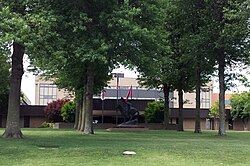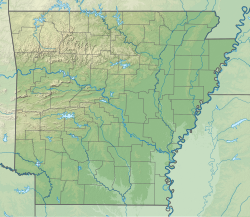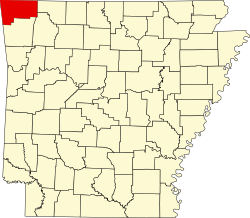This article needs additional citations for verification .(February 2025) |
Springdale | |
|---|---|
| Nickname: | |
 Location of Springdale in Benton County and Washington County, Arkansas. | |
| Coordinates: 36°11′25″N94°09′27″W / 36.19028°N 94.15750°W | |
| State | Arkansas |
| Counties | Washington, Benton |
| Founded | 1838 |
| Government | |
| • Type | Mayor-City council |
| • Mayor | Doug Sprouse [3] |
| Area | |
| 49.70 sq mi (128.73 km2) | |
| • Land | 49.20 sq mi (127.42 km2) |
| • Water | 0.51 sq mi (1.31 km2) |
| Elevation | 1,335 ft (407 m) |
| Population (2020) | |
| 87,672 | |
• Estimate (2024) | 89,368 |
| • Density | 1,711/sq mi (660.5/km2) |
| • Metro | 546,725 |
| Time zone | UTC−6 (Central (CST)) |
| • Summer (DST) | UTC−5 (CDT) |
| ZIP codes | 72762, 72764-72766 |
| Area code | 479 |
| FIPS code | 05-66080 |
| GNIS feature ID | 2405509 [5] |
| Website | www |
| NWA metro population as of 2019 [6] | |
Springdale is a city in Washington and Benton counties in the U.S. state of Arkansas. The city had a population of 84,161 at the 2020 census, making it the fourth-most populous city in Arkansas. [7] It is included in the four-county Northwest Arkansas metropolitan area, which had 546,725 residents in 2020.
Contents
- History
- Geography
- Geology
- Climate
- Demographics
- 2020 census
- 2010 census
- Metropolitan area
- Marshallese population
- Religion
- Economy
- Arts and culture
- Sports
- Government
- Education
- Primary and secondary
- Higher education
- Infrastructure
- Transportation
- Public safety
- Notable people
- References
- External links
Located on the Springfield Plateau deep in the Ozark Mountains, Springdale has long been an important industrial city for the region. [8] In addition to several trucking companies, the city is home to the world headquarters of Tyson Foods, the world's largest meat producing company. [9]
Springdale has been experiencing a population boom in recent years, as indicated by a 133% growth in population between the 1990 and 2010 censuses. [8] During this period of rapid growth, the city has seen the establishment of a Springdale campus of Northwest Arkansas Community College and the Northwest Arkansas Naturals minor league baseball team move into Arvest Ballpark. Tyson remains the city's top employer and is visible throughout the city. Governor Mike Beebe signed an act into law recognizing Springdale as "The Poultry Capital of the World" in 2013. [1] [2]

















